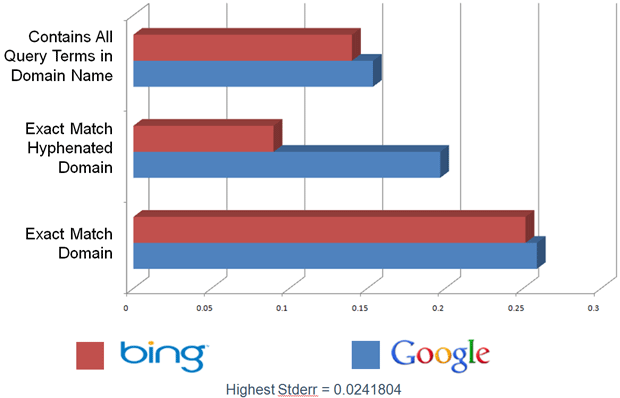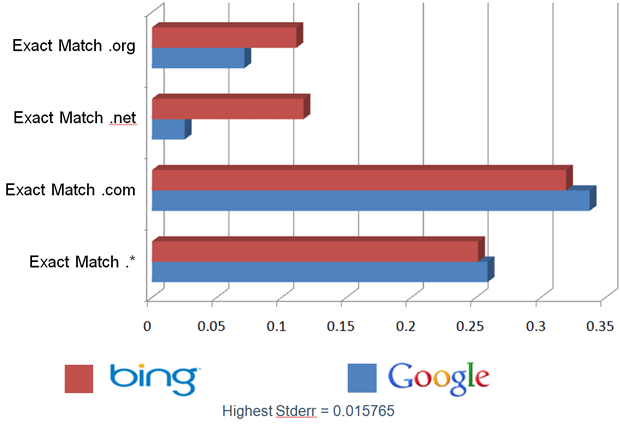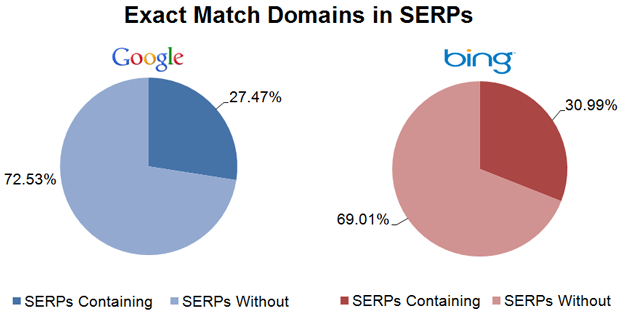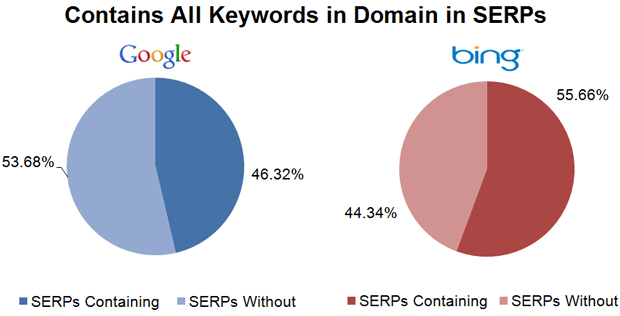
Are Exact Match Domains Too Powerful? Is Their Time Limited?
Last night at the SEOmoz meetup in Avi Wilensky's incredible office space, a frequent topic of discussion both during the presentations/Q+A and in small group networking before and after was the propensity for Google (and Bing) to bias towards exact match domains in the rankings.
How big an issue is exact-match domains? Let's look at some data from our correlation analysis from SMX Advanced earlier this year:

Just by itself, exact match is remarkably high in correlation to rankings. No other on-site/on-page factor we examined even came close. Granted, that's not causation, and it could be other factors influencing those impressively high rankings. Let's get a bit deeper and more granular around the issue:

Holy what?! Actually, this probably isn't very surprising to most SEOs. The second highest correlation we found of anything - links, on-page elements, URL factors, keyword usage, third-party metrics (excluding only Page Authority scores, which are specifically designed to predict Google rankings) was exact-match .com domain names. Yeah - it's powerful stuff.
We can also look at the raw prominence (less interesting for determining what might help a page/site rank, but useful for this application:

That's saying that more than 1/4 and nearly 1/3 SERPs contain an exact match domain in the top 10. The only thing more prominent?

No surprise it's keyword-in-the-domain matches (but not necessarily exact). So, in the first pie chart set, we'd say that for the query "org chart" only orgchart.* type domains would count. In the second, something like myorgcharts.com, greatorgcharts.net, etc. would fit the pattern. These appear in around half of all SERPs on both engines.
The question is, with search results in so many sectors becoming so overrun with obviously over-SEO'd, spammy, manipulative and sometimes, downright poor quality exact-match domains, is Google bound to take action?
Blueglass' Chris Winfield argued that Google is bound to giving outsized benefit to exact match domains because of the brand intent behind so many queries. Since a search for "Alaska Airlines" or "MSN" or "NY Times" is likely to want exactly those websites in the first position, Google's overcompensating in the broader algorithm by biasing towards these exact matches. Many in the audience agreed (and I personally find this viewpoint credible, too).
Interestingly, some of the more experienced, ear-to-the-ground SEO types indicated that they'd heard (or believed) that Google would soon be taking action against exact match domains. One person, who wasn't at the event, but whom I trust a great deal (and will remain anonymous) indicated they thought the next 6 months would bring about this shift.
Personally, I'd welcome it as both a searcher and an SEO. I think Google's relied on exact match for far too long, and it would give them a substantive quality boost over Bing to have more subtlely in the domain matching algo. But, as always, I'm curious to hear what you think - is this really a weakness/problem? Should Google take action? Do you think they will (particularly given the poor track record of improvements like this in the past year or so)?
A completely unrelated p.s. Linking to Twitter profiles (as I did at the start of the post) is curious. Notice that the URLs if you're logged into Twitter look like http://twitter.com/#!/aviw instead of http://twitter.com/aviw. Now,this could be an incredibly dumb move, but actually, both Twitter and Facebook are using Google's new AJAX crawling protocol. Not as SEO-ignorant as they look, eh? :-)
The author's views are entirely their own (excluding the unlikely event of hypnosis) and may not always reflect the views of Moz.



Comments
Please keep your comments TAGFEE by following the community etiquette
Comments are closed. Got a burning question? Head to our Q&A section to start a new conversation.